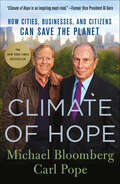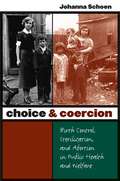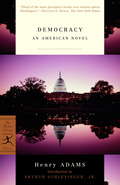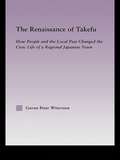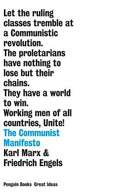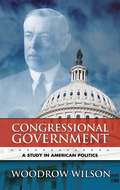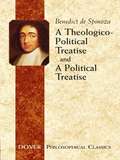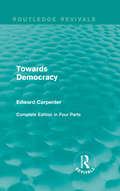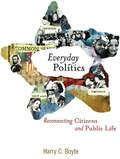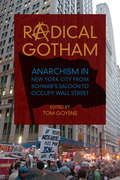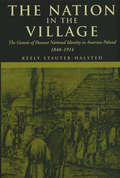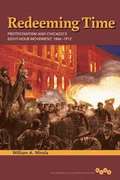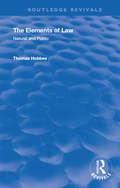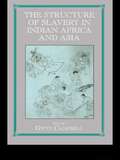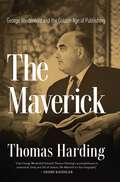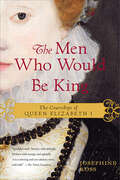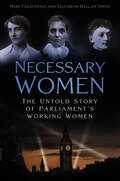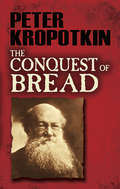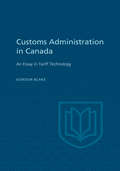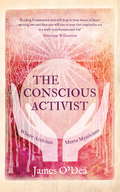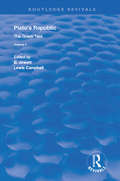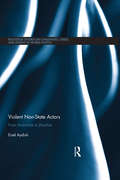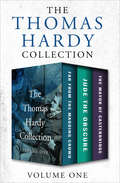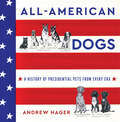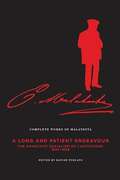- Table View
- List View
Climate of Hope: How Cities, Businesses, and Citizens Can Save the Planet
by Michael Bloomberg Carl PopeNEW YORK TIMES BESTSELLERFrom Mayor Michael Bloomberg and former head of the Sierra Club Carl Pope comes a manifesto on how the benefits of taking action on climate change are concrete, immediate, and immense. They explore climate change solutions that will make the world healthier and more prosperous, aiming to begin a new type of conversation on the issue that will spur bolder action by cities, businesses, and citizens—and even, someday, by Washington."Climate of Hope is an inspiring must read." —Former Vice President Al Gore, Chairman of The Climate Reality Project“Climate change threatens to reshape the future of our world's population centers. Bloomberg and Pope have been leaders on fortifying our cities against this threat, and their book proves that victory is possible—and imperative.” —Leonardo DiCaprio"If Trump is looking for a blueprint, he could not do better than to read a smart new book, Climate of Hope." —Thomas Friedman in The New York Times~The 2016 election left many people who are concerned about the environment fearful that progress on climate change would come screeching to a halt. But not Michael Bloomberg and Carl Pope. Bloomberg, an entrepreneur and former mayor of New York City, and Pope, a lifelong environmental leader, approach climate change from different perspectives, yet they arrive at similar conclusions. Without agreeing on every point, they share a belief that cities, businesses, and citizens can lead—and win—the battle against climate change, no matter which way the political winds in Washington may shift. In Climate of Hope, Bloomberg and Pope offer an optimistic look at the challenge of climate change, the solutions they believe hold the greatest promise, and the practical steps that are necessary to achieve them. Writing from their own experiences, and sharing their own stories from government, business, and advocacy, Bloomberg and Pope provide a road map for tackling the most complicated challenge the world has ever faced. Along the way, they turn the usual way of thinking about climate change on its head: from top down to bottom up, from partisan to pragmatic, from costs to benefits, from tomorrow to today, and from fear to hope.
Choice and Coercion
by Johanna SchoenIn August 2003, North Carolina became the first U.S. state to offer restitution to victims of state-ordered sterilizations carried out by its eugenics program between 1929 and 1975. The decision was prompted largely by a series of articles in the Winston-Salem Journal. These stories were inspired in part by the research of Johanna Schoen, who was granted unique access to summaries of 7,500 case histories and the papers of the North Carolina Eugenics Board.In this book, Schoen situates the state's reproductive politics in a national and global context. Widening her focus to include birth control, sterilization, and abortion policies across the nation, she demonstrates how each method for limiting unwanted pregnancies had the potential both to expand and to limit women's reproductive choices. Such programs overwhelmingly targeted poor and nonwhite populations, yet they also extended a measure of reproductive control to poor women that was previously out of reach.On an international level, the United States has influenced reproductive health policies by, for example, tying foreign aid to the recipients' compliance with U.S. notions about family planning. The availability of U.S.-funded family planning aid has proved to be a double-edged sword, offering unprecedented opportunities to poor women while subjecting foreign patients to medical experimentation that would be considered unacceptable at home.Drawing on the voices of health and science professionals, civic benefactors, and American women themselves, Schoen's study allows deeper understandings of the modern welfare state and the lives of women.
Democracy
by Arthur Schlesinger Henry AdamsAn immediate bestseller upon its publication in 1880, the anonymously penned Democracy prompted widespread speculation and guessing games as to its author's identity. It is the story of Mrs. Lightfoot Lee, a society widow, and Silas Ratcliffe, the most influential member of the Senate, who, throughout the novel, pursues Mrs. Lee while at the same time battling her for power. Set in Washington in the 1870s, Democracy presents a scathing and incisive look at the intricate inner workings of politics and corruption that remains relevant today.This Modern Library Paperback Classic is set from the 1880 first edition and includes a contemporary review from The Atlantic Monthly. From the Trade Paperback edition.
The Renaissance of Takefu: How People and the Local Past Changed the Civic Life of a Regional Japanese Town (East Asia: History, Politics, Sociology and Culture)
by Guven Peter WitteveenThis book tells the story of a citizen group through the example and results of their participation in local civic life. The book draws attention to the complicated conditions under which civic participation may succeed. The story is about the individuals and organizations in the regional Japanese town of Takefu, but these events are also placed in the context of the surrounding Japanese Sea region of west Japan and the wider currents of the Japanese nation-state at the time. Also inlcludes maps.
The Communist Manifesto
by Friedrich Engels Karl Marx Gareth Stedman JonesThe perfect books for the true book lover, Penguin's Great Ideas series features twelve more groundbreaking works by some of history's most prodigious thinkers. Each volume is beautifully packaged with a unique type-driven design that highlights the bookmaker's art. Offering great literature in great packages at great prices, this series is ideal for those readers who want to explore and savor the Great Ideas that have shaped our world. The Communist Manifesto changed the face of the twentieth century beyond recognition, inspiring millions to revolution, forming the basis of political systems that still dominate countless lives and continuing to ignite violent debate about class and capitalism today.
Congressional Government: A Study in American Politics
by Walter Lippmann Woodrow WilsonA remarkable work of scholarship, Congressional Government addresses the difficulties inherent in the American Constitution's separation of legislative and executive powers. Woodrow Wilson wrote this powerful political tract as his doctoral dissertation, and it contains the essence of the future president's political reasoning. A popular and critical success upon its 1885 publication, it remains remarkably vital more than a century later.Wilson argues that in the years following the Civil War, the legislature received unfair advantages from the system of checks and balances, threatening the effectiveness of the constitutionally mandated separation of powers. He proposes the British parliamentary system as an alternative model of openness and responsibility, citing numerous examples of its effectiveness. Frequently quoted by constitutional scholars and advocates of government reform, Congressional Government remains essential to discussions of the balance of power within the U.S. government. This edition features an insightful Introduction by political theorist Walter Lippmann.
A Theologico-Political Treatise and A Political Treatise
by Francesco Cordasco R. H. Elwes Benedict De Spinoza2 important works. Spinoza's "A Theologico-Political Treatise" presents an eloquent plea for religious liberty, demonstrating that true religion consists of the practice of simple piety, independent of philosophical speculation. In the unfinished "A Political Treatise," the author develops a theory of government founded on common consent.
Towards Democracy (Routledge Revivals: The Collected Works of Edward Carpenter)
by Edward CarpenterEdward Carpenter’s Towards Democracy is well-known as a starting point of his later work. Originally written in 1881 whilst taking a break from lecturing in Universities across the UK, this four-volume poem dwells mainly on themes of freedom and equality; values that Carpenter wrote upon many times in his career. Originally published in 1883, this version in 1917, this title will be of interest to students of Sociology and English Literature.
Everyday Politics
by Harry C. BoyteIncreasingly a spectator sport, electoral politics have become bitterly polarized by professional consultants and lobbyists and have been boiled down to the distributive mantra of "who gets what." In Everyday Politics, Harry Boyte transcends partisan politics to offer an alternative. He demonstrates how community-rooted activities reconnect citizens to engaged, responsible public life, and not just on election day but throughout the year. Boyte demonstrates that this type of activism has a rich history and strong philosophical foundation. It rests on the stubborn faith that the talents and insights of ordinary citizens--from nursery school to nursing home--are crucial elements in public life.Drawing on concrete examples of successful public work projects accomplished by diverse groups of people across the nation, Boyte demonstrates how citizens can master essential political skills, such as understanding issues in public terms, mapping complex issues of institutional power to create alliances, raising funds, communicating, and negotiating across lines of difference. He describes how these skills can be used to address the larger challenges of our time, thereby advancing a renewed vision of democratic society and freedom in the twenty-first century.
Radical Gotham: Anarchism in New York City from Schwab's Saloon to Occupy Wall Street
by Tom GoyensNew York City's identity as a cultural and artistic center, as a point of arrival for millions of immigrants sympathetic to anarchist ideas, and as a hub of capitalism made the city a unique and dynamic terrain for anarchist activity. For 150 years, Gotham's cosmopolitan setting created a unique interplay between anarchism's human actors and an urban space that invites constant reinvention. Tom Goyens gathers essays that demonstrate anarchism's endurance as a political and cultural ideology and movement in New York from the 1870s to 2011. The authors cover the gamut of anarchy's emergence in and connection to the city. Some offer important new insights on German, Yiddish, Italian, and Spanish-speaking anarchists. Others explore anarchism's influence on religion, politics, and the visual and performing arts. A concluding essay looks at Occupy Wall Street's roots in New York City's anarchist tradition. Contributors: Allan Antliff, Marcella Bencivenni, Caitlin Casey, Christopher J. Castañeda, Andrew Cornell, Heather Gautney, Tom Goyens, Anne Klejment, Alan W. Moore, Erin Wallace, and Kenyon Zimmer.
The Nation in the Village: The Genesis of Peasant National Identity in Austrian Poland, 1848–1914
by Keely Stauter-HalstedHow do peasants come to think of themselves as members of a nation? The widely accepted argument is that national sentiment originates among intellectuals or urban middle classes, then "trickles down" to the working class and peasants. Keely Stauter-Halsted argues that such models overlook the independent contribution of peasant societies. She explores the complex case of the Polish peasants of Austrian Galicia, from the 1848 emancipation of the serfs to the eve of the First World War. In the years immediately after emancipation, Polish-speaking peasants were more apt to identify with the Austrian Emperor and the Catholic Church than with their Polish lords or the middle classes of the Galician capital, Cracow. Yet by the end of the century, Polish-speaking peasants would cheer, "Long live Poland" and celebrate the centennial of the peasant-fueled insurrection in defense of Polish independence. The explanation for this shift, Stauter-Halsted says, is the symbiosis that developed between peasant elites and upper-class reformers. She reconstructs this difficult, halting process, paying particular attention to public life and conflicts within the rural communities themselves. The author's approach is at once comparative and interdisciplinary, drawing from literature on national identity formation in Latin America, China, and Western Europe. The Nation in the Village combines anthropology, sociology, and literary criticism with economic, social, cultural, and political history.
Redeeming Time: Protestantism and Chicago's Eight-Hour Movement, 1866-1912
by William A. MirolaDuring the struggle for the eight-hour workday and a shorter workweek, Chicago emerged as an important battleground for workers in "the entire civilized world" to redeem time from the workplace in order to devote it to education, civic duty, health, family, and leisure. William A. Mirola explores how the city's eight-hour movement intersected with a Protestant religious culture that supported long hours to keep workers from idleness, intemperance, and secular leisure activities. Analyzing how both workers and clergy rewove working-class religious cultures and ideologies into strategic and rhetorical frames, Mirola shows how every faith-based appeal contested whose religious meanings would define labor conditions and conflicts. As he notes, the ongoing worker-employer tension transformed both how clergy spoke about the eight-hour movement and what they were willing to do, until intensified worker protest and employer intransigence spurred Protestant clergy to support the eight-hour movement even as political and economic arguments eclipsed religious framing. A revealing study of an era and a movement, Redeeming Time illustrates the potential--and the limitations--of religious culture and religious leaders as forces in industrial reform.
The Elements of Law: Natural and Politic (Routledge Revivals)
by Thomas HobbesOriginally published in 1889, Ferdinand Tonnies published versions of two works by Thomas Hobbes. His editions of The Elements of Law: Natural and Politic and of Behemoth: or The Long Parliament were the first modern critical editions, based on manuscripts of works by Hobbes. Completed in 1640, The Elements of Law was Hobbes's first systematic political work. The book helps us see Hobbes's mind at work, for it is the first version of his later political works.
Structure of Slavery in Indian Ocean Africa and Asia
by Gwyn CampbellThe abolition of slavery in and around the Western Indian Ocean have been little studied. This collection examines the meaning of slavery and its abolition in relation to specific indigenous societies and to Islam, a religion that embraced the entire region, and draws comparisons between similar developments in the Atlantic system. Case studies include South Africa, Mauritius, Madagascar, the Benadir Coast, Arabia, the Persian Gulf and India. This volume marks an important new development in the study of slavery and its abolition in general, and an original approach to the history of slavery in the Indian Ocean and Asia regions.
The Maverick: George Weidenfeld and the Golden Age of Publishing
by Thomas HardingThe captivating story of the famed publisher George Weidenfeld, from his struggles as an Austrian-Jewish refugee in London to his rise as a world-renowned literary figure. After arriving in London just before World War Two as a penniless Austrian-Jewish refugee, George Weidenfeld went on to transform not only the world of publishing but the culture of ideas. The books that he published include momentous titles such as Lolita, Double Helix, The Group, and The Hedgehog and the Fox, with authors he championed ranging from Joan Didion, Mary McCarthy, JD Salinger, and Edna O&’Brien to Henry Miller, Harold Wilson, Saul Bellow, and Henry Kissinger. His role as publisher brought him into the orbit of influential figures such as George Bush, Ann Getty, Donald Trump, and LBJ. In this first biography, Thomas Harding provides a full, unvarnished, and at times difficult history of this complex and fascinating character. Throughout his long career, he was written about in the New York Times, the Washington Post, Time Magazine, Vanity Fair, and other publications. Was he, as described by some, the &“greatest salesperson,&” &“the world&’s best networker,&” &“the publisher&’s publisher,&” and &“a great intellectual&”? Was his lifelong effort to be the world&’s most famous host a cover for his desperate loneliness? Who, in fact, was the real George Weidenfeld and how did he rise so successfully within the ranks of New York and London society? Drawing on author correspondence, internal memos, and other documents buried deep in the secret publishing files of Weidenfeld & Nicolson, Harding crafts a portrait of the publisher's life that is inextricable from the efforts and intricacies of putting a book into the world. Structured around twenty books associated with George Weidenfeld, and intercut with explorations of contemporary concerns such as cancel culture, the right to publish, freedom of speech, and separating the art from the artist, The Maverick tells the captivating story behind the life of this iconic publisher.
The Men Who Would Be King: The Courtships of Queen Elizabeth I
by Josephine Ross“Splendid stuff, ‘history with attitude.’ Written with energy and aplomb.” —The Times (London)The colorful, often tempestuous courtships of Queen Elizabeth I of England (the “virgin Queen”) are brought to breathtaking life in The Men Who Would Be King, a thrilling, utterly fascinating popular history by Josephine Ross. The highly respected author of The Winter Queen and The Tudors, Ross captures all the splendors of the royal court, and all the delicious intrigues surrounding the romances of the powerful daughter of King Henry VIII during her glorious reign. The Men Who Would Be King is spirited British history, captivating and eminently readable, that will equally delight fans of historical nonfiction, Tudor aficionados, and anyone who loves the bestselling novels of Philippa Gregory.
Necessary Women: The Untold Story of Parliament’s Working Women
by Mari Takayanagi Elizabeth Hallam SmithDrawing on unique research based on the Parliamentary archives, government records and family history sources, Mari Takayanagi and Elizabeth Hallam Smith show how women touched just about every aspect of the life of Parliament, largely unacknowledged - until now. Along the way, we meet an array of impressive and life-affirming women: from the Rickman sisters eavesdropping on Parliamentary debates from the roof space above the Commons in the 1820s; to Jane, the doyenne of Bellamy's, purveyors of tea, chops, steaks, pies and wine to MPs in the 1840s; and to Jean Winder, the first female Hansard reporter, who fought for years after being appointed in 1944 to be paid the same as her male counterparts. As historians and Parliamentary insiders themselves, Takayanagi and Hallam Smith bring these unsung heroes to life, charting along the way the changing context for working women within and beyond the Palace of Westminster.
The Conquest of Bread
by Peter KropotkinBorn a Russian prince, Peter Kropotkin (1842–1921) rejected his title and wealth to spend his life in pursuit of social justice and equality. His last major work, The Conquest of Bread, surveys economic methods for the satisfaction of human needs. The 1892 treatise also outlines the revolutionary path to his vision of utopia: an anarchist communist society.Kropotkin criticizes the effects of feudalism and capitalism, noting that both systems exacerbate poverty and promote privilege, even in times of abundance. Citing the human propensity toward voluntary cooperation, he proposes the establishment of free, self-sufficient anarchic communesand outlines practical considerations of production and distribution. The author supports his theories with examples from the French rebellions of 1789, 1848, and 1871, and his reasoning anticipates aspects of twentieth-century revolutions in Russia, Germany, and Spain. At a time when many thinkers employed the new Darwinian concept of "survival of the fittest" to justify their capitalist and imperialist goals, Kropotkin pointed out the historic patterns of humanity's best success under cooperative circumstances. A century later, his economic analysis remains fresh and relevant.
Customs Administration in Canada
by Gordon BlakeThe Canadian tariff has been a singularly faithful mirror of economic and political change in this country, but it is a glass through which much has been seen darkly. This study is an attempt to improve the view. It traces the administration of the tariff through Canadian history, and provides the first complete treatment of the subject and its significance for the country's commerce.Dr. Blake's work begins with customs administration during the French régime, and follows with the British period---the struggle for responsible government, the problem of smuggling, and the establishment of free ports. The author discusses such early problems as customs union in the Canadas, reciprocity and the Galt tariff, and ad valorem duties and their administrative consequences. Confederation and its effect on customs administration are analysed, as are the tariff schedule up to modern times, valuation and the effects of war, and the system and problems of appraisement. The customs establishment since Confederation is studied under such heads as organization, problems of adjustment, and political patronage in the service. Finally, the Canadian Tariff Board is put under examination.This study does not constitute an argument on either side of the policy controversy as regards free trade or protection nor is it a linearly historical treatment of Canadian commercial policy. It is an attempt to fit into the Canadian environment certain more or less theoretical concepts which may serve to explain the tariff as an important economic institution. It will be of interest to students of Canadian economic history, particularly in the area of national revenue.
The Conscious Activist
by James O'DeaAn extraordinary and rousing manifesto from award-winning author James O'Dea, The Conscious Activist is both a compelling narrative and a deep reflection on the demands of mystical realization and effective activism. Throughout the book, O'Dea poses that an integration of the two has the power to permanently transform the social order and to wake up humanity from its course of rapid self-destruction. Divided into two parts, Part I offers parallel narratives of author James O'Dea's training and spiritual development as both a mystic and an activist. The mystic, he explains, must move past petty ego concerns in order to experience oneness with each other and our divine source. The activist, on the other hand, explores the role of passion and conscience in activating social change. In Part II, O'Dea pursues this fascinating concept of a meeting ground between the two worlds, where spirituality and action unite to spark an accelerated transition towards our greater goal: a more evolved civilization. He asks us all to become conscious activists - to learn, collectively, how to move beyond our rigid conformity to beliefs of the past and its archaic structures of power and control.
Plato's Republic: The Greek Text (Routledge Revivals)
by B. JOWETT AND LEWIS CAMPBELLFirst published in 1894, this book consists of essays by professors Jowett and Campbell about the classic Greek philosopher Plato, and his famous and widely read dialogue The Republic, which is considered one the world’s most influential works. Plato is believed to be the pivotal figure in the development of Western philosophy, and the editors explore this throughout the book along with relations to other Greek dialogues and authors.
Violent Non-State Actors: From Anarchists to Jihadists (Routledge Studies on Challenges, Crises and Dissent in World Politics)
by Ersel AydinliGiven the importance of violent non-state actors (VNSA) and their evolving role in global politics, dynamic frameworks of analysis are needed both to trace historical trajectories in the evolution of violent non-state actorness and to identify emerging patterns by examining modern day cases. This book examines the defining characteristics and evolutionary dynamics of VNSAs, and introduces a framework based on their autonomy, representation and influence providing a comparative analysis of the late 19th and early 20th centuries’ Anarchist movement and the modern-day Jihadist network. It explores the distinct characteristics of the Anarchists and Jihadists as VNSAs with global potential, not just describing them, but also seeking to understand what they are instances of. With a longitudinal analysis, the book also considers the types of changes that have occurred in the past 150 years and the possible role VNSAs may play in current and future power polity shifts away from states toward non-state actors. It concludes with both theoretical implications for the study of non-state actors and transnational relations, and practical implications for government agencies or private groups tasked with finding ways of countering such violent non-state actors. This important book will be of interest to students and scholars of international relations, political science, and terrorism/security studies. It will also be of interest to practitioners in the security services including think-tank analysts and government security analysts.
The Thomas Hardy Collection Volume One: Far from the Madding Crowd, Jude the Obscure, and The Mayor of Casterbridge
by Thomas HardyThree classics of the Victorian era from the great novelist. This volume includes three iconic novels by the author known for chronicling nineteenth-century English society. Far from the Madding Crowd: A tale of love, tragedy, and a woman brave enough to defy convention. Jude the Obscure: A young stonemason who had aspired to a career in academia finds himself trapped in an unhappy marriage in this novel of passion and heartbreak. The Mayor of Casterbridge: A wealthy mayor harbors a terrible secret in this story of addiction, love, and regret.
All-American Dogs: A History of Presidential Pets from Every Era
by Andrew HagerFrom historian-in-residence at the Presidential Pet Museum, Andrew Hager, comes a fond, fascinating, and often surprising look at the dogs who were the best friends of the presidents, featuring unforgettable photographs.President Biden’s German shepherds, Major and the late Champ, are the latest in a long line of presidential dogs. Dating all the way back to George Washington, dogs have been constant companions to nearly all of America’s presidents. Of the past 46 presidents, 31 have had at least one dog at 1600 Pennsylvania Ave.Organized by historical eras, All-American Dogs will take readers through the captivating history of the White House’s four-legged friends, the impact they had on their owner-in-chiefs, and, ultimately, American history. From the assassination of President’s Lincoln’s dog after Lincoln’s own death to President’s Hoover’s Belgian shepherd, King Tut, who helped President Hoover win the election after appearing in a campaign photo, these furry members of the first family often had a lasting impact on the administrations that kept them.As historian-in-residence at the Presidential Pet Museum, Andrew Hager will include original research and rare photographs from the National Archives to trace the history of America’s first dogs. From post-Revolutionary dogs, to Civil War era dogs, to Cold War dogs, Hager will show the differences and similarities of how our nation viewed man’s best friend.Readers will learn not only past presidents’ dogs in each historical era, but also the cultural history of dogs as pets, and the ways in which Americans’ relationships with dogs has evolved over the past two centuries.
The Complete Works of Malatesta V.III: The Anarchist Socialism of L'Agitazione, 189798
by Davide Turcato Errico Malatesta Paul SharkeyThe first in AK Press's ten-volume Complete Works of Malatesta. This one (volume three chronologically) focuses on two very important years in Errico Malatesta's life, when he returned to Italy to edit L'Agitazione. This volume begins the series with a bang.
